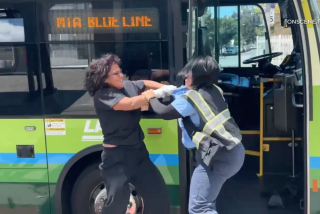O.C. bus strike leaves would-be riders stranded
Across Orange County on Saturday, hundreds of overheated, frustrated and bewildered would-be riders waited for buses that never showed following a walkout by county bus drivers, their first in 21 years.
Some stranded riders sat for 30 minutes and others, like Virginia Pedroza, camped out for hours before being told about the strike.
“I’m looking for the 59 bus, but it’s not coming,” said Pedroza, 50, a red-faced Santa Ana resident lugging two shopping bags. “It’s too hot to walk in the sun.”
Leaders of the county’s 1,100 transit workers rejected a salary increase and a 30-day contract extension just before midnight Friday, shutting down 60% of the county’s bus routes and leaving many of the area’s 225,000 daily riders stranded.
The Orange County Transportation Authority says it ranks 12th in the nation in ridership, with 68.5 million passengers annually.
County transit authorities said the extent of disruption Saturday and today will be less than during the work week because only about half of the county’s riders use the buses on weekends. But with only 31 of 81 routes in service, they acknowledged that the Monday morning commute will be “impacted greatly.”
“We’ve done everything we could to keep negotiations going,” said Carolyn Cavecche, the OCTA’s chairwoman. “We’ve told the union that we are ready and willing to negotiate any time of the day or night.”
Joel Zlotnick, an OCTA spokesman, said the agency met 52 times over four months with union leaders and offered two contract extensions.
Gov. Arnold Schwarzenegger intervened in late April, requesting a court-ordered 60-day cooling-off period.
Union leaders expressed disappointment that the OCTA did not come up with more money.
“If we have a situation where one of the wealthiest transit agencies in California isn’t stepping up to the table, what kind of message is that sending to commuters?” said Patrick Kelly, secretary-treasurer of Teamsters Local 952.
“We’re prepared to stick it out as long as it takes,” he added, and said the union was still open to negotiations. “This could be settled in 10 to 15 minutes.”
Despite both sides’ apparent willingness to negotiate, no further contract talks are scheduled.
Dozens of drivers picketed outside facilities housing buses in Anaheim, Garden Grove and Santa Ana, but there were no reports of any disturbances.
OCTA officials said the county’s surface streets and freeways should see a little more congestion, but not much. Cavecche said about 70% of OCTA riders don’t have access to a car and half are members of families making $22,000 a year or less.
“These people depend on us to get to their jobs, their doctors and for shopping trips,” Cavecche said. “They have no other means of transportation.”
The only lines in operation are those that a private transit firm runs under county contract, including the ACCESS routes for the disabled, feeder routes to the Metrolink and OC Express buses to and from the Inland Empire. The Metrolink train system is not affected by the strike.
The most heavily traveled route, route 43 from Fullerton to Costa Mesa along Harbor Boulevard, will be staffed by supervisors on weekdays, running every 30 minutes from 6 a.m. to 6 p.m. Normal service runs well past 6 p.m. During the strike, all bus rides will be free except for ACCESS service.
Art Leahy, the OCTA’s chief executive, said talks broke down at 11:30 p.m. Friday, about 30 minutes before the cooling-off period expired.
He said transit negotiators increased their offer to $209 million in the afternoon, an $18-million increase from the three-year contract that has expired.
But just before midnight, Leahy said, the Teamsters countered at $209.7 million, a $200,000 increase from their previous demand.
Leahy said the 14.6% raise in wages and benefits in the OCTA deal would give younger drivers, those with five years or less of experience, an hourly wage of $14.27. Top drivers would make $23.87 an hour.
“The offer we made was 10% higher than the one we made two weeks ago,” Leahy said. “That offer compares very favorably to drivers in Long Beach, Riverside, San Diego and Los Angeles.”
But picketing drivers said the high cost of living in Orange County makes the current offer untenable.
“We’re not asking for too much,” said Debra Joines, 49, an OCTA bus driver picketing in Anaheim on Saturday. “It’s about being able to live in semi-comfort, doing a good job and being rewarded for it.”
The union is pressing another key issue -- which union members should receive the greater benefits from the deal. Labor leaders have been focusing on bigger rewards for their senior drivers.
But OCTA officials say they need to improve recruiting and retain their inexperienced drivers in the county’s tight labor market. Cavecche said 40% of the drivers have five years experience or less.
“The union took any pay increase to the younger drivers off the table” Friday, Cavecche said. “They chose to divert that money to older drivers and the Teamsters’ pension.”
--
tony.barboza@latimes.com
More to Read
Sign up for Essential California
The most important California stories and recommendations in your inbox every morning.
You may occasionally receive promotional content from the Los Angeles Times.











